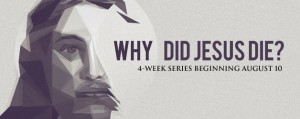
Ant Man – Are You Too Small for the Challenge?
Sycamore Creek Church
July 19/20, 2015
Tom Arthur
Peace friends!
So who has actually heard of “Ant Man” before just now? I had never heard of him as a super hero before looking at the movies coming out this summer. He isn’t the biggest super hero out there. In fact, he’s kind of, well, small. But he packs a big punch!
It’s a good day to be here at SCC because we’re continuing in our summer series, God on Film. Each week we’re looking at a different summer blockbuster. We’re exploring one theme in each movie and looking at what the Bible has to say about that theme. Today’s it’s Antman and the question is: are you too small for the challenges you face?
What BIG challenges are you facing today? Maybe you feel like one person standing against injustice. Or you’ve got too many obstacles in the way of your goals. Or you think your relationship is too far gone. Or you’ve got no hope for a job or a child is in trouble. Maybe you’re struggling with a BIG powerful addiction. Or you feel small and isolated and alone. Or there’s BIG criticism you’re facing and feeling smaller and smaller with every critical comment. Maybe at work you’ve got too much to do and not enough time or employees. Or at church you’ve got too much to do and not enough volunteers. Or financially there are too many bills and not enough money. Or maybe you’re on the opposite side and you’ve got too many opportunities and not enough money to take all of them. Maybe today you know too many people around you who need financial help and you don’t have enough money to help everyone. Or your bad habits are ingrained in BIG ruts. Maybe like at my house there’s too much noise and not enough peace and quiet. Or you’ve got too many kids and not enough time to spend with each one. Sometimes we feel really small in the face of BIG challenges.
Today I want to look at one person in the Bible who was too small and had too many big challenges for God to do much in his life. But one day Jesus walked by.
Jesus entered Jericho and made his way through the town. There was a man there named Zacchaeus. He was the chief tax collector in the region, and he had become very rich.
~Luke 19:1-2 NLT
Zacchaeus is an interesting character in this story. Any Jew reading this in his day would have thought immediately, Zacchaeus is too much of an enemy for God to do anything with. He was the “Chief Tax Collector.” In other words, he was an extortionist. His job was to get as much tax out of you so that he could have as big of a commission as possible. You pay more taxes. He makes more money. What if the IRS worked on a commission? Yikes! Add to that, Zacchaeus was very good at his job. He had become “very rich.” Probably too rich. Remember what Jesus said about rich people? “It is easier for a camel to go through the eye of a needle than for a rich person to enter the Kingdom of God!” (Matthew 19:24 NLT). And these are just the first two of many BIG problems for Zacchaeus. Let’s keep reading.
He tried to get a look at Jesus, but he was too short to see over the crowd. So he ran ahead and climbed a sycamore-fig tree beside the road, for Jesus was going to pass that way.
~Luke 19:3-4 NLT
Yes, Zacchaeus is not only too crooked and too rich, he’s also too short! What a way to punch a man when he’s down. Zacchaeus has BIG problems for God to work in his life and he’s too short to meet Jesus.
When Jesus came by, he looked up at Zacchaeus and called him by name. “Zacchaeus!” he said. “Quick, come down! I must be a guest in your home today.”
~Luke 19:5 NLT
Jesus just walked over a serious line here and you may not have even noticed it. He wants to be a guest in Zacchaeus’ house! What’s so bad about this? Well, Jesus is offering to not only hang out with one wrong person, but he’s going to go hang out in the lion’s den itself! Zacchaeus certainly has too many of the wrong kind of friends, and Jesus wants to go meet them all. Well, this puts the people in an uproar!
Zacchaeus quickly climbed down and took Jesus to his house in great excitement and joy. But the people were displeased. “He has gone to be the guest of a notorious sinner,” they grumbled.
~Luke 19:6-7 NLT
More BIG problems. Now Zacchaeus and Jesus both have a publicity problem. There’s too much criticism. People are seriously displeased. Not just one person but people. A whole crowd of criticism. Of course, there’s criticism. What did Jesus expect? Zacchaeus is a “notorious sinner.” Like the Ant Man, he “broke in and stole stuff.” He cheated people on their taxes.
Needless to say, Zacchaeus had BIG problems and just wasn’t the right kind of person for God to work in. So why does Jesus do it? Because Jesus’ mission is clear:
For the Son of Man came to seek and save those who are lost.”
~Luke 19:9-10 NLT
When it comes to feeling lost amidst BIG problems in the world there are two kinds of people:
- Those who feel small and lost in a BIG world;
- Those who don’t feel small and lost in BIG world.
1. Those who don’t feel small and lost in BIG world.
Let’s begin with the second kind: those who don’t feel small and lost in a BIG world. Did you notice what kind of tree Zacchaeus climbed up? A “sycamore-fig tree!” Before Jesus walked by, Zacchaeus may have been too short to see Jesus, but he was at the top of the food chain when it comes to living in a BIG world. He’s likely not very religious. He’s interested in “BIG” things: money, power, and politics. But catching a glimpse of Jesus was about to change all that. As the “Ant Man” says, “This wasn’t my idea.”
It’s my hope that Sycamore Creek would be a “sycamore-fig tree” that provides a glimpse of Jesus for those who don’t yet know they’re lost in a BIG world. But rest assured, God is at work in that person’s life even though they don’t recognize it yet. John, one of Jesus’ closest followers said, “We love because he first loved us” (1 John 4:19 NRSV). God loves that person even before they realize that they need God’s love back. But for them to respond, there has to be some kind of small stirring in their heart. I think that we at SCC can provide that stirring. We can be the sycamore tree that they climb up and catch a glimpse of Jesus. We do that in many ways but one very significant way: the way we welcome them.
When a first-time guest shows up and gives us their email on the Connection Card, they get an email on Monday welcoming them and are invited to take a 30-second survey. The first question we ask is: what was the first thing you noticed? Over the last year or two here are most of the responses we’ve gotten:
- Friendly people
- The greeter at the door was playful and friendly
- The first thing I noticed was how friendly and inviting everyone was to me.
- Signs inside and greeter
- relaxed atmosphere
- nice building (under construction)
- Everyone was smiling and having a good time.
- The friendliness everyone we saw was saying good morning and happy Easter. It felt awesome!
- Everyone that I met was really nice and welcoming
- Friendly people
- The friendliness of church ‘regulars’ and representatives from church staff.
- Welcoming atmosphere, praise & worship team.
- I could hear the nice music outside of the church
- I was immediately greeted by very friendly greeters.
- Warm greeting from so many people
- Friendly, welcoming people. very accessible worship service
- Friendliness
- Friendliness of people when I walked in
- The friendliness of the congregation.
- Friendly, welcoming atmosphere and a sense that things are “happening” at Sycamore Creek. Clearly an exciting time of growth.
- Friendly people
- The friendliness of congregation
- When people realized that I was a stranger, they smiled and welcomed me.
- The greeter
- There was somebody at the door to greet me as I walked into the building. That was awesome.
- Age diversity for a contemporary service
- orange cones directing traffic, children check in point, and food
- The warm welcome and laid back atmosphere
- The crowd of people and the happy faces. The general atmosphere of well-being….that everything was right with the world at that moment.
- Honestly? The smell of popcorn. After that, the smiles.
- Everyone was so friendly and welcoming!
- How welcoming everyone is
- Everyone was super filled with GOD and happy.
- there was a greeter directing people
- Pastor Tom’s friendliness.
- Greeters opened the door for us and were very inviting
- Friendliest of people
- How quickly people came up to greet me in a very genuine way.
- smiling faces
- Friendly welcome when we entered (and we saw the great sign out front)
- a warm welcome
- The friendliness of everyone.
- Being greeted when we sat down.
- The welcoming feeling I got from my first step in.
- Ministry teamwork. Good communication. Preparedness.
- Warmth
Do you notice any common threads among the answers? It’s pretty obvious isn’t it? People experience a warm welcome here. We don’t always nail it, but we do it more often than not. In the face of BIG questions about how to reach new people, sometimes a small welcome is all that is needed to help someone catch a glimpse of Jesus.
We do this using one simple tool. We call it the 5-10-LINK rule. While we all want to come to worship and reconnect with friends we haven’t seen, we can’t neglect the guest among us. Five minutes before the service and five minutes after the service focus on getting to know someone you don’t know. You don’t have to cover the entire building. Just cover the ten feet around you. That’s probably the seats beside, in front, and behind you. Then LINK that person to others around them. You’ve got ants in your kitchen? Let me introduce you to Bob, he’s got ants in his whole house!
OK, one caution here. Welcoming guests can be overdone. This is a bit of an art form. Watch for signs and cues about how much that person really wants to interact with you or others. Are their answers to your questions short and to the point? Is their body language closed? Then welcome them and let them move on.
Friends, for those who don’t feel lost in a BIG world, we can be the “Sycamore Tree” that someone climbs up on and catches a glimpse of Jesus.
2. Those who feel small and lost in a BIG world
While there are some who don’t feel lost in this BIG world, many of us feel like the ant man:
For those who do feel small and lost in a BIG world, it’s my hope that Sycamore Creek would be a place where Jesus regularly passes by. I don’t mean a “place” in the sense that the building is where Jesus passes by. The building is a tool. The community that meets in the building is the “place.” Wherever the community is at, that’s the place. I also don’t mean that a pastor is the place where Jesus passes by. I mean the whole community. Each one of you. The pastor is just the chief equipper, the head coach of the community. I also don’t mean a formal ministry of the church, as important as that is. Ministries are tools the community uses to create spaces where Jesus can come to town. What I do mean is that wherever you are, there Jesus is passing by. You are the “Sycamore Tree” that people will climb up to see Jesus when he passes by!
When people encounter Jesus at Sycamore Creek, everything changes! Our “smallness” actually becomes a strength. As John the Baptist says, “He [Jesus] must become greater and greater, and I must become less and less” (John 3:30 NLT). I think you could say, “Jesus becomes bigger and I become smaller.” Your mission in life becomes clear as it lines up with Jesus’ mission. Why you exist becomes clear as it fits into why Jesus exists. Your vision for what can be gets bigger. You see how God can use your small contribution to accomplish BIG things. Your creativity for how God will get you to where God wants you gets bigger. Jesus takes you to unexpected places. Let’s go back to Zacchaeus and see how God does big things through this small man.
Big Outcome for a “Small Person”
Meanwhile, Zacchaeus stood before the Lord and said, “I will give half my wealth to the poor, Lord, and if I have cheated people on their taxes, I will give them back four times as much!”
~Luke 19:8 NLT
Zacchaeus has a BIG change of heart. His heart moves from greed to BIG generosity. He gives away half his wealth! And some of you complain about 10%. There’s a BIG turnaround in how he treats people. He makes things right by giving them back what he stole with interest, 400% interest!
Jesus responded, “Salvation has come to this home today, for this man has shown himself to be a true son of Abraham. For the Son of Man came to seek and save those who are lost.”
~Luke 19:9-10 NLT
Jesus’ mission is clear: “The son of man came to seek and save those who are lost.” Jesus’ mission overcomes BIG obstacles and results in BIG salvation.
Are the Obstacles too BIG for SCC?
I want to take a moment and reflect on some unique obstacles that SCC is facing right now. They are unique because of the size of our church. Those who study church size describe four different sizes of church from small to big. The first three sizes are:
- Family Size Church (made up of a couple of families) – <75
- Pastoral Size Church (made up of the friends one pastor can sustain) – 76-140
- Small Program Size Church (made up of several pastoral size churches under one roof with key staff being the “pastor” of each “church”) – 225-400
Notice the jump from pastoral size church at 140 to small program size church at 225. In between this is a fourth church size:
- Transition Size Church – 14-225
It’s a transition size church because it is “too large to be a small church and too small to be a large church” (The Myth of the 200 Barrier). It is also called the awkward size church. It’s awkward because a church of this size needs facilities, staff, and programs all at the same time but only has the resources to cover one at a time.
So where is Sycamore Creek? Sycamore Creek has on average 220 people every weekend. We are at the top end of the transitional size church, but I think our transitional nature is somewhat exaggerated because we never have 220 people all gathered in one service. We have three services that are each family to pastoral sized. When it comes to facilities, staff, and programs, we’ve focused rightfully so on facilities. But if we are going to continue to grow, we’ll need to focus more and more on the other two: staff and programs. You can grow programs in one of two ways: with staff or volunteers. It’s my sense that God is calling SCC to grow our programs primarily with volunteers. Individuals giving small amounts of time can together accomplish great things. Consider the ant:
I think God is calling us to mobilize twice our current volunteers in three different areas: teaching ministries, caring ministries, and hospitality ministries. When it comes to teaching, you’ll begin seeing more and more volunteers and staff preaching and teaching. If we’re going to launch seven satellites in seven venues on seven days of the week, we’re going to need more preachers than just me! As we continue to reach new families with young children and teenagers, there will be more opportunities to serve in Kids Creek and StuREV than ever before.
When it comes to caring ministries, a family size and pastoral size church can easily receive care from one pastor. A pastor is essentially a family chaplain for a family sized church! But that doesn’t work when you’re providing care for 220 people. Because if there is an average of 220 people in worship on the weekend, that means there are 300-500 people in our orbit. So you’re going to see Tom Fox, a retired pastor in our church beginning to organize volunteers to provide care in the hospital. You’ll see our Caring and Listening team providing congregational care for our church so that I’m not the only one doing counseling. You’ll begin seeing other staff doing funerals and weddings.
When it comes to hospitality we’re about to open a new Connection Café on Sunday mornings. But wouldn’t it be great to see that café open other days of the week?! There will be more opportunities than ever before to help provide a warm welcome with a warm drink in our new Connection Café. Another key aspect to hospitality is a clean facility. When the building is clean, some small and BIG obstacles are removed from a guest encountering God in this building.
Now we can do this. We do it pretty regularly. When we take our worship Live on Location (LOL) “ants” come out of the woodwork to lift the heavy loads. At Baptism @ The Beach we had sixty people sign up to help make that day happen. Many hands made light work. And many hands turned a park into a sacred place where BIG salvation happened in the lives of those who were baptized that day. Is SCC too small for the task? Not when Jesus walks by this way!
Prayer
God help us to look to you when we feel small and the obstacles feel BIG. Use us together to accomplish BIG things in the lives of those we meet. May we join Jesus in seeking and saving those who feel small and lost amidst this BIG world. In Jesus’ name, AMEN.








Recent Comments